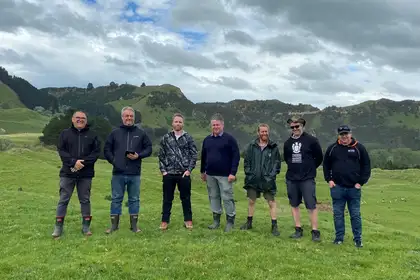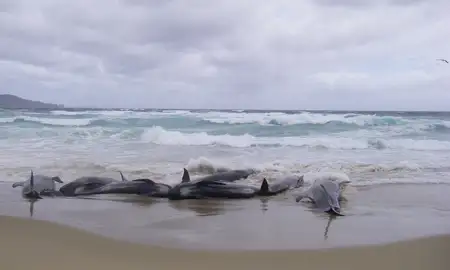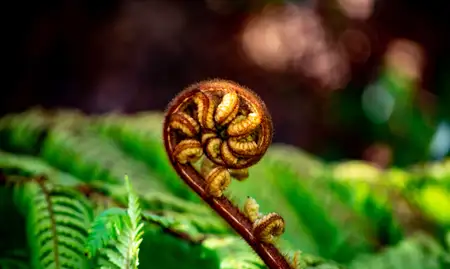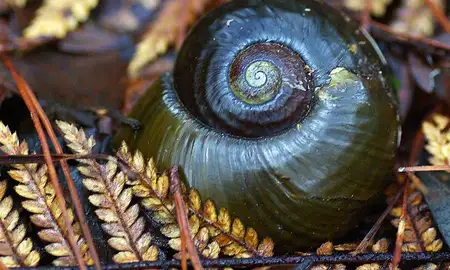
Team members (L-R): Grant Huwyler, Professor Jonathan Procter, Daniel Parker, Adjunct Associate Professor Alan Palmer, Willie McKay, Dr Callum Rees, Matt Irwin. Photo taken by Utiku Potaka.
The funding has been awarded for a project that draws on the expertise of He Waka Uru Ora (Te Rūnanga o Ngā Wairiki – Ngāti Apa), Te Rūnanga o Ngāti Hauiti, Horizons Regional Council, inSite Archaeology and Te Kunenga ki Pūrehuroa Massey University. It will explore the past, present and future impact on land, water and people caused by the Pūtōrino landslide in the Rangitīkei Valley.
The Te Pūnaha Hihiko: Vision Mātauranga Capability Fund, run by the Ministry of Business, Innovation and Employment (MBIE), aims to strengthen capability, capacity, skills and networks between Māori and the science and innovation system and increase understanding of how research can contribute to the aspirations of Māori organisations and deliver benefit for Aotearoa New Zealand.
This funding round saw a total of $3.8 million awarded across 16 projects over the next two years.
Building on two years' work and discussions between the three leaders, the collaborative project will explore the social and environmental implications of the 1855 landslide dam outburst flood in the Rangitīkei Valley. The research team aims to extend our record of natural hazard events beyond the limited extent of European settlement and written history.
The project recognises that Māori have inhabited low-lying floodplains and coastal areas for generations, developing a deep cultural and spiritual connection with the whenua. Prior to European arrival, Māori moved with the seasons for kai gathering purposes and constantly adapted to the dynamic conflict between Tāne Mahuta, Tāwhirimātea and Tangaroa.
This work is guided by He Awa Whiria – a 'braided rivers' metaphor describing conversations between Māori and non-Māori about synergies between mātauranga and science. Harnessing multi-generational mātauranga, combined with science knowledge, will help inform modern society’s ability to meet the challenge of climate change. The project includes precision surveys to characterise the whenua around Pūtōrino. Iwi collaboration informs tikanga for the partnership, facilitating access to awa, whenua and mātauranga. Along with cataloguing oral history, landscape information and historic documentation through a Rangitīkei Mātauranga-a-iwi lens, it will inform mātauranga-based land use management decisions. This will, in turn, support building resilient Rangitikei communities, promote mātauranga and science amongst rangatahi and build capability within partner organisations including the potential to support ongoing collaboration.
Utiku Potaka from Whakauae Research Services is leading the project for his iwi.
"This is a great chance to work with experts, share knowledge and build collective understanding of the impacts of a significant natural event in our locality. I’m looking forward to seeing what lessons can be learned from the event that will help us navigate through the changing climate,” he says.
Grant Huwyler is Group Chief Executive Officer of Te Rūnanga o Ngā Wairiki – Ngāti Apa and is an authority on the tribal history and traditions of his iwi.
“This research represents a unique opportunity for Ngāti Apa to collaborate with Ngāti Hauiti and land scientists to understand an important event in the history of our awa. Generations of Ngāti Apa lived on the Rangitīkei River from the time of our early ancestors including Tuariki, Tamatāne and Rangitauira. Names like Te Awamate and Te Awahou further downstream remind us of the changing watercourses associated with the Rangitīkei River. Better understanding the history and the geology of the river will inform better decisions regarding the awa and its catchment for the future," Mr Huwyler says.
Dr Callum Rees, from the School of Agriculture and Environment, leads Massey’s side of the project with help from Senior Tutor Matthew Irwin, and under the experience and guidance of Professor Jonathan Procter, Muaūpoko, Ngāti Apa, Ngāi Tahu, and Adjunct Associate Professor Alan Palmer.
Dr Rees says this is a fascinating project looking at big landscapes and events up the Rangitīkei Valley that have shaped the land, water and people.
“I am excited about strengthening the relationships between our partners, building a platform to attract young people into the sciences, and showing the world the importance of the Rangitīkei Valley as an archive into our past so that we can put our current climate trajectory and relationship with the environment into perspective.”
Joining them, inSite Archaeology’s Daniel Parker, has close working relationships with Mr Huwyler, Horizons Regional Council and Massey staff and students. He contributes his deep knowledge of Rangitīkei history and has compiled an extensive database of useful documentation and maps.
Horizons Regional Council Senior Land Information Advisor William McKay provides a diverse background in geology, soils and land-use management, supporting the project through technical oversight.
“I am excited to be part of a project working with researchers and engaging with mātauranga to holistically investigate and understand this historical landslide, including the downstream implications of it. The results of this project will enhance the knowledge of these types of landslides, allowing for better planning in future events and their potential effects on a larger and more static population,” Mr McKay says.
The MBIE assessment panel who determined which proposals would be funded stated that the research proposal was an exemplary alignment of Rangitīkei Mātauranga-a-iwi and applied geosciences.
Related news
Two Massey projects receive funding from Te Pūnaha Hihiko: Vision Mātauranga Capability Fund
Professor Isabel Castro and Professor Karen Stockin are involved in projects that address conservation and mātauranga Māori, in partnership with Māori collaborators.

Three Massey projects awarded MBIE Vision Mātauranga Capability funding
Of the 16 grants funded across the motu, Massey is leading three research projects, and partnering on another.

Strong result in MBIE Vision Mātauranga Capability Fund
The Ministry of Business, Innovation and Employment has awarded three Massey University research projects nearly $750,000 from the Te Pūnaha Hihiko: Vision Mātauranga Capability Fund.
